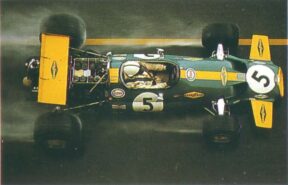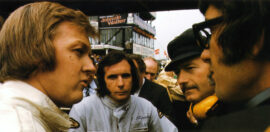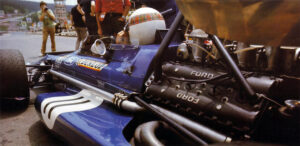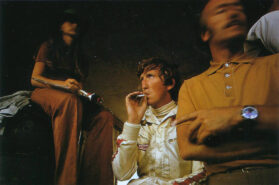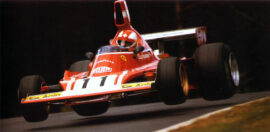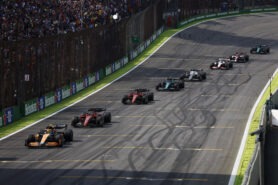The Golden Era of Formula 1: The 1970s
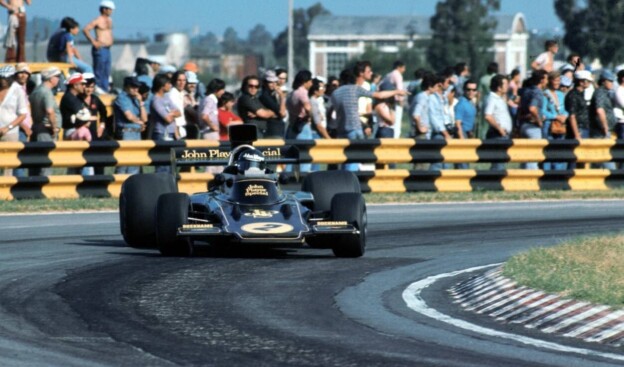
| Table of Contents |
| 1. The Cars and Constructors of the 1970s |
| 2. The Drivers of the 1970s |
| 3. The Races and Seasons of the 1970s |
| 4. Conclusion |
The 1970s is considered by many to be a "golden era" of Formula 1 racing. The decade was marked by a number of iconic drivers, teams, and races that continue to be remembered and celebrated today. The cars were flashy, powerful, and dangerous. The drivers were charismatic and daring. And the racing was fierce, competitive, and often unpredictable.
One of the major developments of the 1970s was an increased focus on safety in the sport. The decade began with a number of tragic accidents and fatalities, leading to the formation of the Grand Prix Drivers' Association (GPDA) and the introduction of new safety measures, such as better barriers and improved medical facilities at race tracks.
At the same time, the 1970s also saw a number of changes and innovations in the sport. Cars became more aerodynamic, with the introduction of wings and ground effects, and engines became more powerful, with a transition from naturally aspirated engines to turbocharged ones. The sport also saw significant growth in popularity and commercial success, with an increase in the number of race tracks and races and an expanding global audience.
The 1970s era was also remembered as the years of rivalry between teams and drivers, Jackie Stewart, Niki Lauda and James Hunt are some of the notable figures that marked that era with their performances, this fierce competition on and off the track helped to cement the 1970s as a truly memorable decade in the history of Formula 1.
1. The Cars and Constructors of the 1970s
The 1970s was a decade that saw a number of iconic cars and teams competing in Formula 1. Among the most successful and memorable were Ferrari, Lotus, McLaren, and Tyrrell.
Ferrari, one of the most well-known and successful teams in the history of Formula 1, had a number of iconic cars during the 1970s, including the 312T, 312B and 312B3. These cars were known for their powerful engines, advanced aerodynamics, and cutting-edge technology. Ferrari's team in that era also included legendary drivers such as Jacky Ickx, Clay Regazzoni and of course Niki Lauda.
Lotus, led by Colin Chapman, was known for its innovative and technically advanced cars. The Lotus 72, which debuted in 1970, was one of the most successful cars of the decade and featured a number of groundbreaking design elements, such as inboard brakes and a wedge-shaped aerodynamic body. The team also had a talented driver lineup, including Jochen Rindt, Emerson Fittipaldi, and Ronnie Peterson.
McLaren also had a successful decade, winning the championship in 1974, 1976 and 1984. The team was notable for its sleek and powerful cars, such as the M23 and the M26, and for its talented driver lineup, including Emerson Fittipaldi, James Hunt, and Niki Lauda.
Tyrrell, which debuted in the late 1960s, also had a successful decade, winning the championship in 1971 and 1973 with its innovative and competitive cars, such as the Tyrrell 003 and the Tyrrell 006.
In terms of innovations and advancements in car design and technology, the 1970s saw a number of significant developments. One of the most notable was the introduction of aerodynamic wings and ground effects, which helped to increase downforce and improve the handling and stability of the cars. Additionally, the 1970s saw a transition from naturally aspirated engines to turbocharged ones, which increased power and speed but also brought new challenges in terms of reliability and fuel consumption.
The 1970s was also a decade marked by continuous experimentation and innovation by the teams, each trying to gain an edge over the other, this drive for innovation was the catalyst for many advancements in car design, aerodynamics and technology, which ultimately led to the modern Formula 1 cars we know today.
2. The Drivers of the 1970s
The 1970s was a decade that saw some of the most iconic and successful drivers in the history of Formula 1. Among the top drivers of the decade were Jackie Stewart, Niki Lauda, James Hunt, and Emerson Fittipaldi.
Jackie Stewart, often referred to as the "Flying Scot", was one of the dominant drivers of the 1970s. He won three World Championships (1969, 1971, 1973) during the decade, and was known for his smooth and consistent driving style. Stewart also played a key role in increasing safety in Formula 1 as he was a co-founder of the Grand Prix Drivers' Association (GPDA) and a vocal advocate for improved safety measures in the sport.
Niki Lauda, the Austrian driver, was another dominant figure in the 1970s. He won his first championship in 1975 with Ferrari and then again in 1977 and 1984 with McLaren. He was known for his strategic and analytical approach to racing, as well as his ability to set fast lap times. Unfortunately, Lauda was involved in a serious accident during the 1976 German Grand Prix, but he made a remarkable comeback in the same year and went on to win two more championships, an example of his strong will and determination.
James Hunt, the British driver, was one of the most charismatic and flamboyant drivers of the 1970s. He won the World Championship in 1976 with McLaren, and was known for his aggressive and exciting driving style. Hunt's rivalry with Niki Lauda was one of the defining storylines of the 1976 season and is still one of the most celebrated in the history of Formula 1.
Emerson Fittipaldi, the Brazilian driver, was a two-time Formula 1 World Champion, winning his first title in 1972 with Lotus and then again in 1974 with McLaren. He was known for his smooth and precise driving style, as well as his ability to set fast lap times.
All of these drivers left a mark on the history of Formula 1 with their performances, rivalries and iconic moments. Their battles on the track and the larger than life personalities off it added to the excitement and drama of the 1970s era, which has been remembered as one of the most fascinating in the sport's history.
3. The Races and Seasons of the 1970s
The 1970s was a decade filled with memorable races and intense championship battles. Some of the most notable races of the decade included the 1970 Italian Grand Prix. The 1970 F1 drivers' title was won by Jochen Rindt posthumously after his fatal accident during the practice session. Another memorable race was the 1976 Japanese Grand Prix, which was won by James Hunt in dramatic fashion and secured him his F1 World Championship.
The 1971 season was marked by the intense battle between Jackie Stewart and Ronnie Peterson for the World Championship, with Stewart ultimately coming out on top. The 1972 season was highlighted by Emerson Fittipaldi's first World Championship win with Lotus.
The 1976 season was one of the most dramatic and memorable in the history of Formula 1, and was defined by the intense rivalry between Niki Lauda and James Hunt. Lauda had a large lead in the championship, but suffered a near-fatal accident at the 1976 German F1 Grand Prix. Hunt capitalized on Lauda's absence to close the gap in the standings, and the championship ultimately came down to a dramatic finale at the Japanese Grand Prix, where Hunt won and secured his only World Championship.
Even movies where made about the 1976 F1 season. In 2013 the movie "Rush" came out. It's a feature film that tells the story of the 1976 Formula 1 season and the rivalry between James Hunt and Niki Lauda. The movie covers the events of the season, including the dramatic crash that nearly killed Lauda and the dramatic finale that saw Hunt win the World Championship.
You can rent or buy this full great movie here.
In terms of changes and developments in the rules and regulations of the sport, the 1970s saw a number of significant changes. One of the most notable was the introduction of a new points system, where the top finishers in a race were awarded points that were then used to determine the World Championship. Additionally, the 1970s saw the introduction of new safety measures, such as better barriers and improved medical facilities at race tracks, as well as regulations to make the sport more environmentally friendly. The 1970s was also the decade that saw an increase of number of races on the calendar, this increase brought more diversity to the championship and made it more challenging for the teams and drivers.
In conclusion, the 1970s was a decade filled with memorable races, intense championship battles, and significant changes and developments in the sport. The era set the foundation for modern Formula 1, the innovations and advancements in car design and technology, the fierce competitions and the rivalry between drivers were the key element that helped to cement the 1970s as one of the most memorable decades in the history of Formula 1.
4. Conclusion
The 1970s was a decade that had a profound impact on the sport of Formula 1 and left a lasting legacy. It was a decade marked by iconic cars and teams, legendary drivers and fierce competitions, innovations and advancements in car design and technology and an increased focus on safety. The era of Formula 1 in the 1970s has come to represent a time when the sport was at its purest and most exciting, where the thrill of speed and danger was much more on the edge.
When looking at the present era of Formula 1, it's clear to see that many of the innovations and advancements that were developed during the 1970s have become the foundation of modern Formula 1. From aerodynamics to power units and safety regulations, much of the technology used in today's cars was pioneered during the 1970s. The current cars are faster and more advanced, but the excitement and drama that made the 1970s era so memorable, is still present and brings the same adrenaline rush to the fans.
The sport has also evolved in terms of popularity and commercial success, with a larger global audience and more races on the calendar. The sport now also have a big focus on environment and sustainability, something that was not as important in the 1970s era.
In conclusion, the 1970s was a truly remarkable decade in the history of Formula 1. It represented a time of innovation, excitement and intensity, and left a lasting impact on the sport that is still felt today. The era may be over but the memories and the legacy will remain forever.
✅ Check out more posts with related topics:


